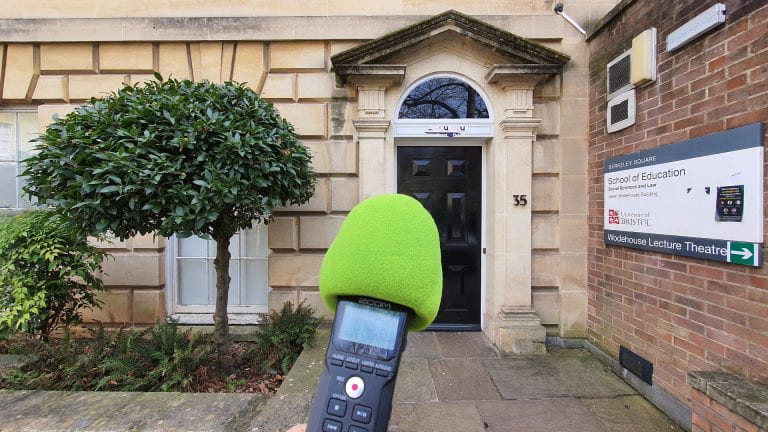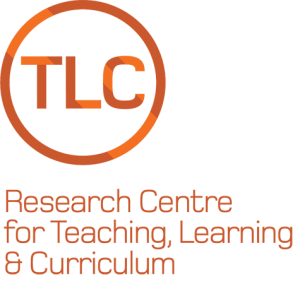Blog by Dr Rachel Helme and Michael Rumbelow, TLC Research Centre, School of Education
How to record and represent the non-verbal sounds of the School of Education? This was the challenge we set ourselves in an experimental research project recently funded by the TLC Research Centre.
Several constraints were explicit in the brief, for example to avoid identifiable human speech, to spend a certain number of hours on production, ethically to make people aware of when and where and why we were recording, to use only the relatively modest equipment budgeted for, and to produce a short podcast-length soundfile of up to 20 minutes.
Other constraints and challenges quickly became apparent, such as how in practice to ensure the quality of recordings, to eliminate the woofing of wind blowing on the mic and the intrusion of the chatter of passers by, which our self-imposed rules precluded.

As well as philosophical dilemmas during recording of who decides where to point the microphone, and when and why? Whether to aim to record one person’s aural experience of the school, or to somehow represent multiple, potentially simultaneous perspectives? Does a lift announcement count as an identifiable human voice? (We decided not).
And in the edit more dilemmas of what to cut, in what order to sequence audio clips, or layer them polyphonically, and what audio effects, if any, to add? We became increasingly aware that sounds are contextual and ephemeral, often fleeting and subliminal, yet can be as evocative as images or words, and somehow precious, fragile and easily lost, for instance during the Covid lockdown.
Eventually between the two of us we recorded in parallel on the same day, discussed and recorded some more, discussed and edited, mixed and remixed our recordings, in dialogue with each other, with people we met around the School, and with the physical environment of the School and its vicinity, listening with raised awareness to the birdsong of Berkeley Square, the creaking of the automatic sliding doors, the aircon and the distant siren wails and screeching gulls.
A work in progress
The result is a work in progress, a synthesis of soundclips recorded while wandering with microphones around the School, with fluid intentions, following our pricked ears, caught attention, echoes, silences, foraging for resonances. And then in the edit cutting, sequencing, juxtaposing and mixing clips, listening again in new ways and hearing new sounds.
As an experimental project we have deliberately applied multiple approaches and styles, we hope capturing some sounds that colleagues who inhabit the building will easily recognise and respond to, and others that have been treated with effects or mixed with other audio to sound strange.
Eventually we felt a piece of sound of around 12 minutes had gelled sufficiently to publish as a record of our experimental attempts to represent some moments in the audible life of the School as a knowledge-producing organism, through the noises our contact with it makes, as we pass in, around and out of it each day.
We welcome feedback and any suggestions or offers to remix. As well as any recordings of sounds in the School significant to you we have not yet captured. The original raw ingredient sounds are available on request.
With thanks to TLC for funding the project and to everyone in the School for your patience and non-verbal noises while we were recording.
Click the link to listen to the recording:
https://on.soundcloud.com/wwkxe
Centre for Teaching, Learning and Curriculum (TLC)
 The Centre for Teaching, Learning and Curriculum (TLC) is concerned with questions relating to education in schools, universities, community and out-of-school contexts, including a focus on issues of social justice. We research the learning of individuals, groups and systems from a range of perspectives, including practitioner research.
The Centre for Teaching, Learning and Curriculum (TLC) is concerned with questions relating to education in schools, universities, community and out-of-school contexts, including a focus on issues of social justice. We research the learning of individuals, groups and systems from a range of perspectives, including practitioner research.
